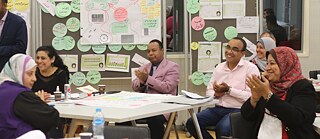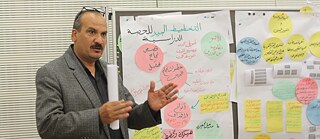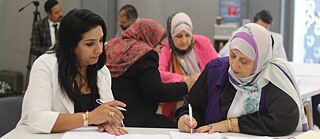It is not limited to German language teachers...
The “Digital Teaching Methods” Project is for all school subjects
In conjunction with the developments and changes that have taken place in the world, the methods of teaching pupils in the classroom have changed and have become compatible with the new conditions. In this regard the Goethe-Institute was keen on providing modern teaching and education methods for all school subjects, bypassing the barrier of speaking German.
By Reham Al-Iraqi - November 27, 2022
The “Digital Teaching Methods” is a Program in partnership with the Ministry of Education. It aims to develop the teachers' skills in the different governorates of the Arab Republic of Egypt and enables them to convey their experiences to their colleagues in order to overcome all obstacles that they face with their pupils in the classroom.
It is not limited to German language teachers
The Digital Teaching Program is not limited to German language teachers, but also includes Arabic, history, science and mathematics teachers, as the Goethe-Institute is keen to provide the opportunity for as many teachers as possible in all disciplines.A large number of teachers and education experts, who come from different governorates, with various backgrounds and do not speak German, gathered at the Goethe-Institute. What they have in common is their great passion and their aim to learn the art of digital teaching; one of the most important arts used to achieve instant electronic communication between pupils and teachers and to exchange experiences with each other.

Use of modern digital tools
Dr. Ilaria Atef Zaki, Head of the Social Studies Department, Nile Egyptian International Schools, October Branch, and one of the participants in the “Digital Teaching Methods” Program at the Goethe-Institute, emphasized the great benefit from the program and described the experience as “fruitful”. As she said, it is not only about exchanging experiences between teachers, but rather convey these experiences and explain how to teach online to our colleagues in the different governorates.
Ilaria indicated that the “Digital Teaching Methods” Program enabled female and male teachers to use modern digital tools and apply them in a practical way. The organizers of the program motivated the participating teachers and made them passionate to complete the programs. Although it was difficult to gather a large number of teachers from different cultural backgrounds and different governorates, but the Goethe-Institute was able to do that, which helped us to exchange experiences. It was an enriching experience for all participants.
From his side, Hani Ramadan, an Arabic language expert at the Office of the Arabic Language Advisor at the Ministry of Education, said: «The Digital Teaching Program at the Goethe-Institute enabled us to manage an effective school class and to use the latest educational tools and new and modern methods. This helped me to convey information to all pupils in a better way. The sessions and workshops were not only about getting acquainted with each other and simulating, but also about exchanging experiences between each other in a systematic and practical way.»

Availability of technological innovations and overcoming all difficulties that face the teachers
Dr. Mahmoud Haggag, Physics Instructor at the Directorate of Education in Cairo, and one of the participants, underlined that the program focuses on the most important skills that keep pace with the current technological and educational innovations, that the teachers need. It also takes into account all educational dimensions in order to help the teachers overcome the obstacles they may face with their pupils in the classroom.Abdullah, a mathematics teacher, said: «The program consists of online courses and workshops, besides a practical training part at the Goethe-Institute, in which we were trained on teaching and digital transformation, and learned the principles of teaching and social forms. We acquired different skills through individual and other workshops. As trainees, we are capable of conveying these strategies and experiences to a larger group of teachers.»

Providing a complete training package for teachers and making it available as a reference for self-education
Dalia Shalaby, Director of the Department of Educational Cooperation at the Goethe-Institute Cairo, explained that the “Digital Teaching Methods” Program is one of the projects of the Goethe-Institute, which aim to help Non-German-Speaking teachers' develop their digital teaching skills.
The content of the educational package was written by German experts from different universities, such as the Aachen University and the British Open University. It was then translated into Arabic and adapted to suit the Egyptian curricula.
She pointed out that what really distinguishes the project is that it is not based on the Goethe-Institute only, but is in partnership with the Ministry of Education. «We identified together with the responsible persons at the Ministry the objectives and the educational content the teachers need and made a full training package.»
Alaa Abdullah, the project coordinator, pointed out that a large number of Arabic, history, science and mathematics teachers have been trained on the art of seminar to be able to convey knowledge to their colleagues in the governorates.
